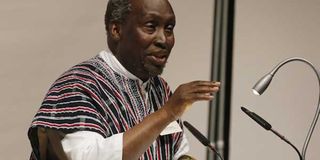Shot in the arm for Kiswahili as Ngugi’s dream finds roots

Ngugi wa Thiong'o speaks at the University of Bayreuth on May 5, 2014. “Literary artist” (with no “e” at the end of the word artist) was the term I had used to describe Ngugi wa Thiong’o, the celebrated Kenyan story-teller. PHOTO | COURTESY | PETER KOLB
What you need to know:
- This water having passed under the bridge, Ngugi, nevertheless, appears to have received an even better gift for Christmas. A new prize, the Mabati-Cornell Kiswahili Prize for African Literature, has been launched that could see his dream of entrenching African languages finally find its roots in the continent.
- Writers wising to enter their work can send unpublished manuscripts or books in the genres of fiction, poetry, memoir or graphic novel, written in Kiswahilli to [email protected] by March 31 2015.
Commentary on Ngugi wa Thiong’o narrowly missing the Nobel Prize for Literature once again this year, ranged from apathetic, to angry to humorous.
One wag memorably tweeted an imaginary depiction of Kanye West pushing through journalists and shouting in Gikuyu: “Imma let you finish, but Ngugi was robbed!” a humorous nod to the 2009 Taylor Swift-Beyonce VMA debacle.
This water having passed under the bridge, Ngugi, nevertheless, appears to have received an even better gift for Christmas.
A new prize, the Mabati-Cornell Kiswahili Prize for African Literature, has been launched that could see his dream of entrenching African languages finally find its roots in the continent.
Launched a week ago at the Ake Book Festival in Nigeria on November 18, the prize was founded by Mukoma wa Ngugi, a writer and literature don based in America, and Lizzy Attree, director of the Caine Prize for African Writing.
Mukoma wa Ngugi is Ngugi’s son.
CASH PRIZES
Apart from the prize’s boost to Kiswahili literature by encouraging more genres (fiction, poetry, memoir and graphic novels) and a fair sum in cash awards (first prize is $5,000, (Sh450,000), the second prize is $3,000 (Sh270,000) and the third prize is $2,000 (Sh180,000)), this award stands out for the fact that it brings on board yet another corporate group, to support local literature, Mabati Rolling Mills of Kenya.
At present, Text Book Centre is the sole corporate group that sponsors literature in Kenya.
Mukoma wa Ngugi pointed to the importance of local firms coming in to support the arts: “African philanthropy can and should be at the centre of African cultural production.”
Aimed at celebrating works of excellence in African languages, the prize also encourages translation from, between and into African languages.
Apart from the cash prizes, winners also stand to benefit from being published by East African Educational Publishers (EAEP) and the Africa Poetry Book Fund.
The four prize-winning writers will spend a week in residence at Cornell University and a week at an additional partner institution.
Writers wanting to enter their work can send unpublished manuscripts or books in the genres of fiction, poetry, memoir or graphic novel, written in Kiswahilli to [email protected] by March 31 2015.
Manuscripts should be over 50,000 words for fiction, and 60 pages for poetry.
The shortlist will be announced in July 2015 and the winner announced in October of the same year.




